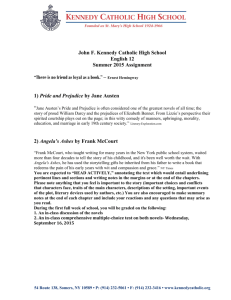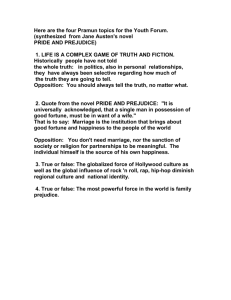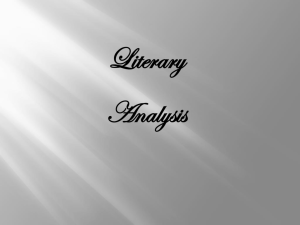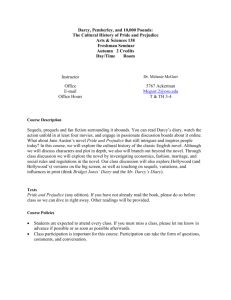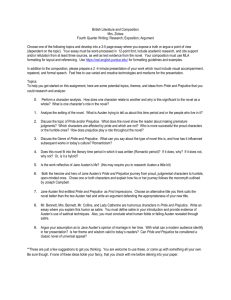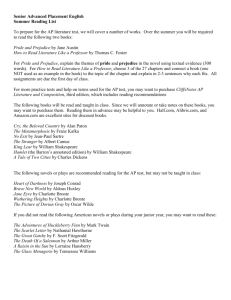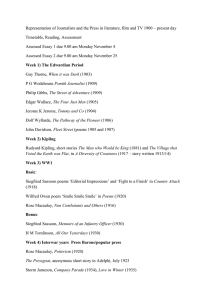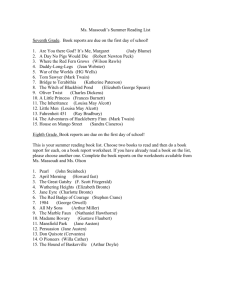212-02. B. Clarke
advertisement
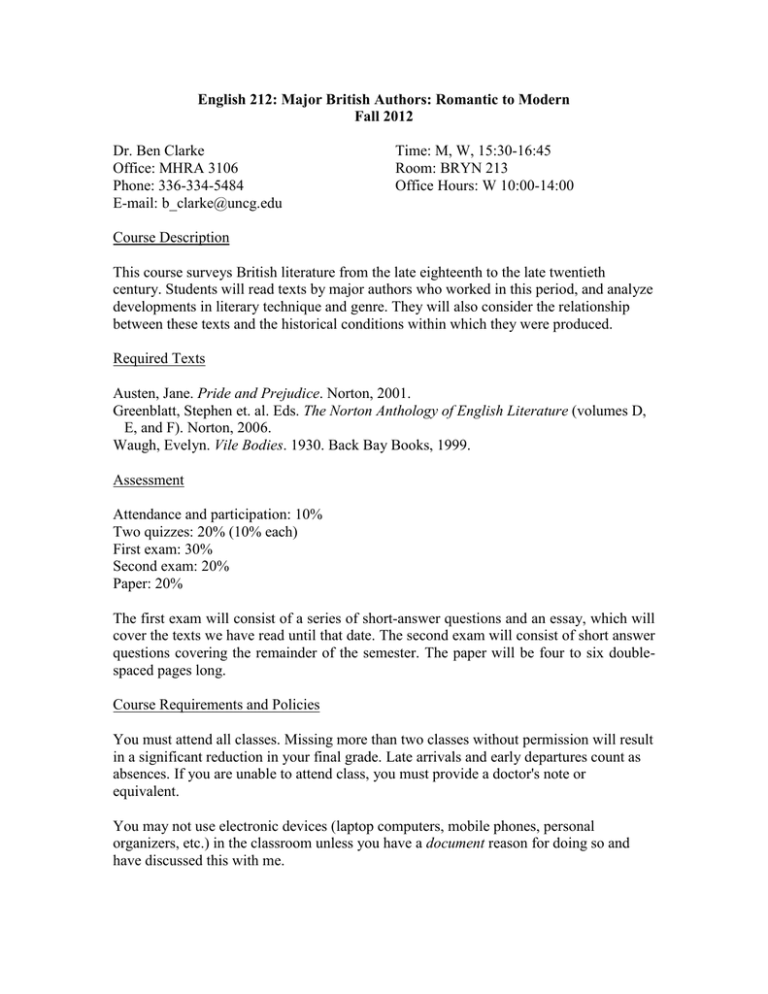
English 212: Major British Authors: Romantic to Modern Fall 2012 Dr. Ben Clarke Office: MHRA 3106 Phone: 336-334-5484 E-mail: b_clarke@uncg.edu Time: M, W, 15:30-16:45 Room: BRYN 213 Office Hours: W 10:00-14:00 Course Description This course surveys British literature from the late eighteenth to the late twentieth century. Students will read texts by major authors who worked in this period, and analyze developments in literary technique and genre. They will also consider the relationship between these texts and the historical conditions within which they were produced. Required Texts Austen, Jane. Pride and Prejudice. Norton, 2001. Greenblatt, Stephen et. al. Eds. The Norton Anthology of English Literature (volumes D, E, and F). Norton, 2006. Waugh, Evelyn. Vile Bodies. 1930. Back Bay Books, 1999. Assessment Attendance and participation: 10% Two quizzes: 20% (10% each) First exam: 30% Second exam: 20% Paper: 20% The first exam will consist of a series of short-answer questions and an essay, which will cover the texts we have read until that date. The second exam will consist of short answer questions covering the remainder of the semester. The paper will be four to six doublespaced pages long. Course Requirements and Policies You must attend all classes. Missing more than two classes without permission will result in a significant reduction in your final grade. Late arrivals and early departures count as absences. If you are unable to attend class, you must provide a doctor's note or equivalent. You may not use electronic devices (laptop computers, mobile phones, personal organizers, etc.) in the classroom unless you have a document reason for doing so and have discussed this with me. Your essay should be typed (Times New Roman font 12), double-spaced (with standard one inch margins), paginated, and headed with your name and the course number. Please use MLA citation. You must hand in a physical copy of your paper and submit it electronically through Safeassign. You are responsible for keeping copies of all your work and notes. You must hand in all work on the date given on the syllabus unless a documented emergency prevents you from doing so or you have received an extension from me before the assignment is due. I will penalize late papers by one-third of a grade for every day beyond the deadline. Bigoted and intolerant language and behaviour will not be accepted in the classroom. Cheating and Plagiarism Please read the university policies on cheating and plagiarism. Any violation of these policies will result in you receiving an F for the course and being reported to the Dean of Students Office. If you have any questions about cheating or plagiarism, please see me during office hours. Schedule Please note that you must read all the introductions to the writers we are studying in the Norton anthology. This will help you to locate each piece of work within its historical and theoretical contexts. All page numbers refer to the Norton Anthology unless otherwise stated. 20 August: Introduction. syllabus and course outline. William Blake “The Lamb” (120) and “The Tyger” (129) 22 August: William Blake, “The Chimney Sweeper” (121) and “Holy Thursday” (122) from Songs of Innocence and “The Chimney Sweeper,” (128) “Holy Thursday,” (127) “The Sick Rose,” (128) “The Garden of Love” (131) and “London” (132-3) from Songs of Experience 27 August: Mary Wollstonecraft, from A Vindication of the Rights of Woman (211-39) 29 August: William Wordsworth, “Expostulation and Reply,” (280-81) “The Tables Turned,” (281-2) “Lines Written a Few Miles above Tintern Abbey,” (288-92) “Composed upon Westminster Bridge,” (344-5) “The world is too much with us” (347) 3 September: Labor Day. No class. 5 September: Samuel Taylor Coleridge, “The Rime of the Ancient Mariner” (443-459) 10 September: Percy Bysshe Shelley, “Mutability,” (751-2) “To Wordsworth,” (752) “Ozymandius,” (776) “Ode to the West Wind,” (791) George Gordon, Lord Byron, “Darkness” (618-19) 12 September: Jane Austen, Pride and Prejudice (1-65) 17 September: Jane Austen, Pride and Prejudice (66-130) 19 September: Jane Austen, Pride and Prejudice (131-195) 24 September: Jane Austen, Pride and Prejudice (196-254) 26 September: Quiz. John Keats, “Ode to a Nightingale,” (927-29) “Ode on a Grecian Urn,” (930-31) “Ode on Melancholy,” (932-3) 1 October: First exam 3 October: Robert Browning, “My Last Duchess,” (1282-3) Matthew Arnold, “Dover Beach,” (1387-8) Alfred, Lord Tennyson, “Ulysses” (1170-72) 8 October: Christina Rossetti, “Goblin Market,” (1496-1508) “Song (“When I am dead, my dearest”),” (1490-1) “Promises Like Pie-Crust,” (1509) “Sleeping at Last” (1511-12) 10 October: Joseph Conrad, Heart of Darkness (1953-75) 15 October: Fall Break. No class. 17 October: Joseph Conrad, Heart of Darkness (1975-2011) 22 October: Edward Thomas, “As the Team's Head Brass,” (2022) Isaac Rosenberg, “Break of Day in the Trenches,” (2030) Wilfred Owen, “Dulce Et Decorum Est,” (2037) Siegfried Sassoon, “The General,” (2024-5) “On Passing the New Menin Gate” (2026) 24 October: Evelyn Waugh, Vile Bodies (1-80) 29 October: Evelyn Waugh, Vile Bodies (81-160) 5 November: Evelyn Waugh, Vile Bodies (161-240) 7 November: Evelyn Waugh, Vile Bodies (241-321) 12 November: James Joyce, “The Dead” (2282-2311) 14 November: Quiz. D. H. Lawrence, “Odour of Chrysanthemums” (2483-96) 19 November: T. S. Eliot, “The Love Song of J. Alfred Prufrock” (2524-27) 21 November: Thanksgiving. No class. 26 November: Stevie Smith, “Our Bog is Dood,” (2600) “Not Waving but Drowning,” (2601) Philip Larkin, “High Windows,” (2785-6) “This Be the Verse” (2788) 28 November: George Orwell, "Shooting an Elephant" (2605-10) 3 December: Second exam. Paper due.
